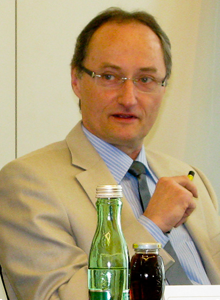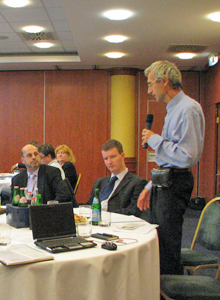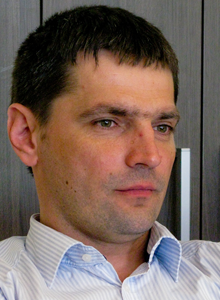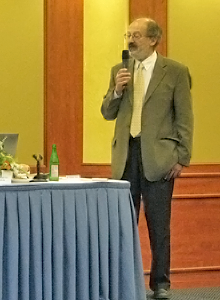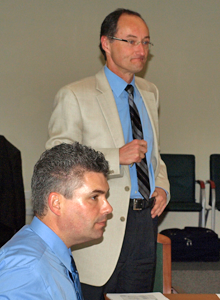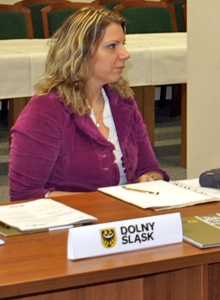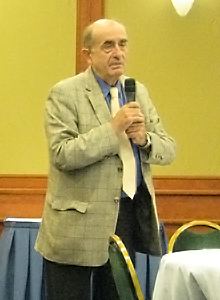FOCUS
InTraMed-C2C in front of National and International Audience
In May 2013 InTraMed-C2C was presented by István Valovics, the project manager of PP10 (BME EMT) at two events in Budapest. The first one, the 11th National Conference on Medical Informatics was sponsored by InTraMed-C2C as well, drawing the attention of the nearly two hundred participants to the fact: they can make good use of the tools supporting the innovation transfer from clinics to companies, developed by the project.
 Nearly 20 presentations in the plenary session at this conference dealt with the sectorial infocom developments, the practical applications of infocom technologies and the hospital information systems. Research, development, innovation and the presentation of an IT cluster project were in the focus of the three section blocks.
Nearly 20 presentations in the plenary session at this conference dealt with the sectorial infocom developments, the practical applications of infocom technologies and the hospital information systems. Research, development, innovation and the presentation of an IT cluster project were in the focus of the three section blocks.
The presentation on the InTraMed-C2C project was delivered in the R+D+I section moderated by the experts of BME EMT. István Valovics outlined the concept, the goals, the working practices and the tools of the project, and reported on a few Hungarian innovation ideas, as well. He called the audience’s attention to the website and the innovation database of the project. Concerning the database, it has been emphasized: it functions as an internet-based marketplace, serves for linking the clinical and the company side, and is open for everyone by the mediation of regional agents. In the roundtable of the afternoon program BME EMT and the InTraMed-C2C project, respectively – in the person of István Valovics – was also represented. The codification and funding issues of the telehealth services, the problems of the personal health care and the difficulties of the long term sustainability of the R+D+I projects were the focus of the discussion.
The second event was organized within the frame of the Hungarian-Italian Cultural Season. It was a special thematic international workshop on e-health and info biomedical technologies. After the introductory thoughts the program of the Hungarian-Italian thematic workshop at the Óbuda University was carried out in four sections. The main topics: the importance of bilateral relations in e-health and telemedicine; results of the research projects; WABT (World Academy of Biomedical Sciences and Technologies) contribution to the bilateral meeting, international cooperation; results of young researchers. The afternoon program was closed by a roundtable.
In his presentation István Valovics underlined the transregional aspects of the innovation transfer. He emphasized: the project partners of InTraMed-C2C – as agents assisting the innovation transfer – are delighted at the requests from any European country with innovation ideas or business and manufacturing competence. The InTraMed-C2C medical innovation database is the main tool in the project for the transregional matching of innovations and production capacities.
The participation in these conferences as well as a long article about the project activities, which has been published in the periodical IME (the professional journal of health managers) aimed to promote InTraMed-C2C and disseminate the results.
Willkommen bei InTraMed-C2C!

InTraMED ist ein europäisches Projekt mit Beteiligung von zehn Projektpartnern aus sieben zentraleuropäischen Ländern. Basierend auf den Erfahrungen und einer Projektidee des Gesundheitsclusters Oberösterreich, wurde das Projekt unter der Konsortialführung des Forum MedTech Pharma im November 2009 von der EU zur Förderung bewilligt. Die Projektlaufzeit beträgt 3 Jahre (04/2010 – 03/2013). Es wurde deutlich, dass Krankenhäuser ein großes Innovationspotential im Bereich der Produkt-, Verfahrens- und Dienstleistungs-Entwicklung für den Gesundheitsmarkt besitzen. Auf dem Weg der Weiterentwicklung dieser Vorschläge gibt es jedoch viele Hemmnisse, die einer Umsetzung in vermarktbare Produkte, Patente und Verfahren entgegenstehen.
Im Rahmen von InTraMED werden Maßnahmen erarbeitet und implementiert, die kleinen und mittleren Unternehmen (KMUs) den regionalen und transnationalen Zugang zum Innovationspotential der Krankenhäuser erschließen.

Die Umsetzung der Ideen aus den Krankenhäusern in Produkte scheitert oftmals, weil Kliniken und Unternehmen unterschiedliche Zielsetzungen beim Umgang mit innovativen Ideen haben. Kliniken sind einerseits Endverbraucher industrieller Innovationen und andererseits die treibende Kraft beim bottom-up-Ansatz des Technologietransfers für innovative industrielle Produkte. Unternehmen, speziell Global Player, haben ein großes Interesse am Abverkauf ihres bereits bestehenden Produktportfolios im Krankenhausmarkt. Innovative Neuprodukte sind für sie nur bei hohen Umsatzerwartungen interessant. Durch ihre gut ausgestatteten Marketingressourcen haben die Global Player einen sehr guten Zugang zu den Hauptentscheidern im Krankenhausmarkt aufgebaut. Daher dominiert deren Anteil bei den im Krankenhausmarkt verwendeten Produkten und Dienstleistungen deutlich. KMUs und Entwicklungen, die von klinischem Personal angestoßen werden, haben oftmals nicht die Mittel und Möglichkeiten, ihre Ideen und ihr Wissen in entsprechende Produktentwicklungen umzuwandeln.
Im Rahmen des Projektes wird ein Innovationstransfer-System für die Hauptakteure der regionalen Innovationsnetzwerke entwickelt, das als Austausch- und Koordinationsmechanismus speziell für Innovationen im medizinischen/klinischen Sektor dienen soll. Dieses Innovationstransfer-System wird in das regional bestehende Innovationsnetzwerk eingebettet. Aufgrund seines transnationalen Ansatzes wird IntraMED dieses Netzwerk über Ländergrenzen hinweg weiterentwickeln, um innovative Ideengeber und Firmen, die diese Ideen umsetzen möchten, zusammenzuführen. Im Rahmen des Projektes soll ein europäisches Netzwerk für den Innovationstransfer geschaffen werden, das als offene Austauschstruktur im zentraleuropäischen Raum für Innovationen im medizinischen Bereich und deren umsetzenden Firmen und Institutionen gedacht ist.
